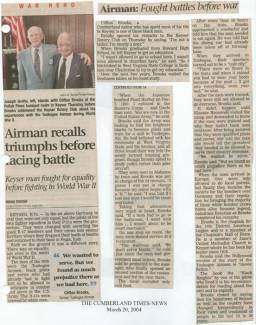Collection Name
About
WAR HERO Airman: Fought battles before war
Airman recalls triumphs before facing battle Keyser man fought for equality before fighting in World War II
KEYSER, W.Va. —--
We wanted to serve. But we found as much prejudice there as we had here. Clifton Brooks, former Tuskegee Airman
In the air above Germany in 1945 they were not only equal, but the pilots of the 99th fighter squadron in their P-51s were the protectors. They were charged with escorting the giant B-17 bombers and their crews into enemy territory where they dropped their loads of bombs and returned to their base in Fogia, Italy. Back on the ground it was a different story. There was no equality, not even in the midst of World War II. The men of the 99th were the Tuskegee Airmen, black pilots and crews who had already had to fight just to be allowed to participate in combat and serve in the U.S. Army. The B-17s were crewed by white men. Clifton Brooks, a Cumberland native who has spent most of his life in Keyser, is one of those black men. Brooks opened his remarks to the Keyser Rotary Club on Thursday by saying, "I'm not a talker, I'm mostly a doer." When Brooks graduated from Howard High School, he left Keyser to get an education. "I wasn't allowed to go to school here; I wasn't even allowed in churches here," he said. "So I hitchhiked to West Virginia State College in Institute near Charleston to try to get my education." Over the next two years, Brooks waited the freshmen tables so he could study.
"When the Japanese bombed Pearl Harbor on Dec. 7, 1941, I enlisted in the Reserve Corps — and Uncle Sam said, 'You are now in the United States Army,'" he said. Brooks said the Army was looking to find the brightest blacks to become pilots and train for a unit in Tuskegee, Ala. He had enlisted with his roommate at West Virginia State and his brother, and all three found their way into the newly formed training program, though Brooks opted to study codes rather than pilot aircraft. They were sent to Alabama by train and Brooks was put in charge of the 24 recruits. "I guess I was put in charge because my name began with a 'B,'" he said. "I was told if I lost one man I would be court martialed." Taking that admonition very much to heart, Brooks said, "If a man had to go to the bathroom, I went with him ... I wasn't about to be court martialed." On one stop en route, the men were denied service at a restaurant. "The waitress said, 'We don't serve blacks,'" he said. But since the men had government meal tickets, Brooks said he protested to the manager, who finally opened an unused section of the restaurant and fed the men there. The meal included only cold food.
After more than 10 hours on the train, Brooks approached a conductor and told him that the men needed to eat again. He was told that the dining car had already been taken off at Birmingham. When they arrived in Tuskegee, their quarters turned out to be a "tent city." "There were no floors in the tents and when it rained you had to wear your boots because of the mud ... it got into everything, even your bed," he said. After the men were trained, they were still not allowed to go overseas, Brooks said. It didn't happen until Eleanor Roosevelt visited the camp and demanded to know if the men were trained and why they hadn't been sent overseas. After being assured that they were qualified pilots and crews, she told the men she would tell the president they needed to be allowed to serve their country overseas.
"We wanted to serve," Brooks said. "But we found as much prejudice there as we had here." When the men arrived in Europe, they were only allowed to do local patrols, but finally they became the escorts for the bombers over Germany and their reputation for bringing the majority of those white bomber crews home alive became legend, noted one Rotarian as Brooks completed his remarks.
Brooks is the chaplain for the 10th District American Legion and is a member of the Chaplain's Hall of Fame. He is a member of Jane's United Methodist Church in Keyser where he has been lay leader since 1976.
Brooks said the Hollywood version of the story of the Tuskegee Airmen is "movie fiction." The book the "Black Knights" by one of the pilots who lived it is his recommendation for reading about the unit and its exploits. Brooks closed by saying that his hometown of Keyser as well as the country have changed tremendously in their views and treatment of people in the last 25 to 30 years.
Note: Clifton E. Brooks was born in 1922 and died in December 2021
-- Photograph: John A. Bone/Times-News Joseph Gratto, left, stands with Clifton Brooks at the Polish Pines banquet room in Keyser Thursday before Brooks addressed the Keyser Rotary Club about his experiences with the Tuskegee Airmen during World War ll.
